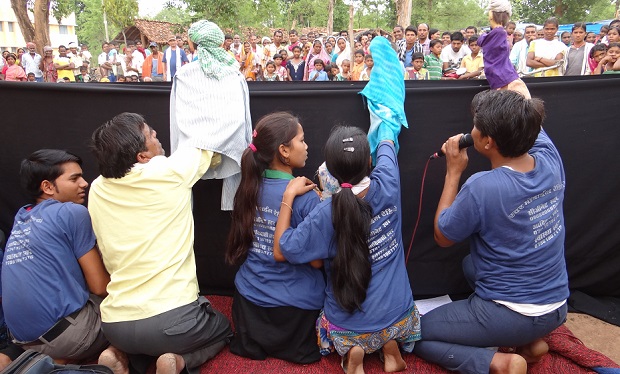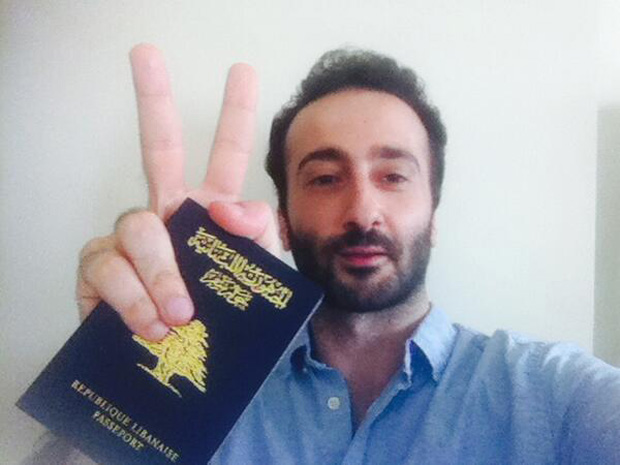25 Jun 2015 | Azerbaijan, Azerbaijan News, Europe and Central Asia, News and features

Rahim Haciyev, editor of Azerbaijani newspaper Azadliq, holds up a copy at the 2014 Index awards (Photo: Alex Brenner for Index on Censorship)
Index award-winning newspaper Azadliq, widely recognised as one of the last remaining independent news outlets operating inside the country, is facing imminent closure. This comes amid an ongoing crackdown on critical journalists and human rights activists in Azerbaijan, and as the country is hosting the inaugural European Games in the capital Baku.
A statement from the paper, quoted Thursday on news site Contact, outlined its “difficult financial situation”.
“If the problems are not resolved in the shortest possible time, the publication of the newspaper will be impossible,” it read.
“The closure of an independent media outlet like Azadliq, which Azerbaijani officials have suffocated over the past two years, flies in the face of repeated assurances from President Ilham Aliyev that his government respects press freedom. The fact that this financial crisis is occurring during the Baku European Games just underlines the shameful disregard that the Azerbaijani government has for freedom of expression,” said Index on Censorship CEO Jodie Ginsberg.
Azadliq has long faced an uphill battle to stay in business. Thursday’s statement merely detailed the latest development in a serious financial crisis, brought about at the hands of Azerbaijani authorities.
In July 2014, Azadliq was forced to suspend print publication. Editor Rahim Haciyev told Index that the government-backed distributor had refused to pay out the some £52,000 it owed the paper, which meant it could not pay its printer.
The paper has also seen its finances squeezed through being banned from selling copies on tube stations and the streets of Baku, and being slapped with fines of some £52,000 following defamation suits in 2013. The paper was also evicted from its offices in 2006 and its journalists have been repeatedly targeted by authorities. Seymur Hezi, for instance, was in January sentenced to five years in prison for “aggravated hooliganism” — charges widely dismissed as trumped up and politically motivated.
Azadliq — meaning “freedom” in Azerbaijani — has appealed to the public for help to stay afloat, urging “those who defend the freedom of speech in Azerbaijan” to join in the campaign to save the paper.
This comes after the Parliamentary Assembly of the Council of Europe (PACE) condemned “the crackdown on human rights in Azerbaijan”. In a resolution adopted on Wednesday 24 June, PACE called on authorities to “put an end to systemic repression of human rights defenders, the media and those critical of the
government”.
This article was posted on 25 June, 2014 at indexoncensorship.org
4 Jul 2014 | Awards, News and features
Three months have passed since the 2014 Index Awards and we caught up with arts nominee, Lucien Bourjeily. The Lebanese playwright told Index he is working on the sequel to his play, Will It Pass Or Not?, which was banned because it was about censorship. He hopes the same will not happen to the sequel, but says that even if it does, he is motivated to keep working and to get his message out.
Lebanon: General security return passport to critical writer (29 May 2014)
Index Freedom of Expression Awards: Arts nominee Lucien Bourjeily (13 March 2014)
From the Magazine: Will It Pass or Not? A play by Lucien Bourjeily (12 Feb 2014)
18 Jun 2014 | Asia and Pacific, Awards, India

Volunteers put on a puppet show to teach rural people about the CGNet Swara project (Image: Purushottam Thakur)
Three months after winning the Index Digital Activism Award for his work with CGNet Swara, Shubhranshu Choudhary spoke to Index about his most recent project, teaching rural villagers through performing arts how their mobile phones can be used to report incidents and issues that may otherwise be given the cold-shoulder by the authorities.
CGNet Swara (Voice of Chhattisgarh) is a mobile phone service that allows citizens to upload and listen to reports in their local language without the need for a smartphone or an internet connection.
The new experiment, as Choudhary referred to it, ran for a month, from 15 May to 15 June, and included volunteer artists performing in market places and villages in six of India’s 29 states. During this time the average number of daily reports jumped from 500 to 800, although, as Choudhary pointed out, it is too early tell if this was just an anomaly.
The team involved flipped their conventional method of teaching on its head. Previously, rural people were brought to the cities where they sat in classrooms and lectured about how to use the service. By physically going to the villagers instead, CGNet Swara has “reversed the order”, now teaching people in a way that makes them feel comfortable.
“We have made dance, we have written songs about our work, we have made a small drama, and there are characters that are puppets,” Choudhary told Index. “So in an entertaining way we try to tell them the problems with current mainstream media, which everyone should have equal access to, but unfortunately is owned and controlled by a small number of rich people.” This has resulted in a media full of information about the rich, according to Choudhary, with 80% of the population only receiving about 20% news coverage.
Between five and six million people speak Gondi in the six states CGNet Swara has visited, but they lack their own communication platform, with no radio station, newspaper or TV channel available in the Gondi language. CGNet Swara allows people to report incidents and get their voices heard when they might otherwise have been shunned.
Choudary was clear to point out that the people for whom this service is most vital are not uneducated, but rather a huge number of them live in rural areas and “feel more comfortable listening and speaking rather than reading and writing”. In a country where most Indians don’t have access to the internet but over 70% have access to a mobile phone, services like CGNet Swara play a pivotal part in giving the majority of the population a voice.
“By improving your communication platform, by improving the structure of communication within a community, by improving it from a top-down, one-way communication method to a bottom-up dialogue model of communication we are able to solve many smaller problems,” Choudhary told Index. “And maybe we will be contributing towards solving bigger problems as well.”
So how does CGNet Swara work? The programme allows people to phone in reports in their native language to the service, where they are then verified, translated and made available for playback online as well as over the phone. This is where urban activists come in to play. As Choudhary told Index, these are the people with the connections to the authorities, who speak the right language and can help getting these issues and problems solved. They complete the circle.
After the apparent success of last month’s trial period Choudhary is keen to continue with the project. “From what I gather from everyone, everyone’s pretty excited, but we will need some funding to continue it.” He told Index the project is not cheap to implement but “we are pretty convinced this is the way to reach these people.
“We feel convinced that this is the way to reach that last person of our community, because they are the ones who are left out. They are the ones whose voices are not coming out.”
Listen to the full interview with Shubhranshu Choudhary below.
This article was published on June 18, 2014 at indexoncensorship.org
29 May 2014 | Lebanon, Middle East and North Africa, News and features

(Photo: Lucien Bourjeily/Twitter)
Lucien Bourjeily is smiling, and with good reason. Only two days earlier, the dark blue Lebanese passport he is holding up had been confiscated by the country’s intelligence agency, with no clear information of when he might get it back. The explanation given? “You know what you did.”
Speaking to Index on Censorship from Beirut, it’s clear that Bourjeily does know. This was not his first run-in with Lebanon’s General Security Directorate. The well-known writer saw his recent play about censorship in Lebanon banned by the agency, which counts media censorship among its many roles. His play was “unrealistic”, the censors told Bourjeily, the irony of the situation lost on them.
The experience earned him a nomination for this year’s Index awards. While he couldn’t attend the awards ceremony in London, he will be travelling to the UK in June to take part in the LIFT Festival with his latest production Vanishing State, which deals with redrawing borders in the Middle East. It was his attempt to renew his passport for this trip — another area under the jurisdiction of the directorate — that led to his latest ordeal.
Bourjeily is convinced the confiscation had been agreed on beforehand. Everyone he dealt with from the general security that day were saying the same thing, despite being in different rooms. “That’s how you know the decision had already been taken.”
A public figure in Lebanon, Bourjeily’s case drew huge media attention. People across the country rallied behind him, and lawyers offered to represent him for free. “I feel very lucky to have so much support, and that my case got so much favour in the public opinion,” he says.
He believes his latest case especially strikes a chord with his countrymen and women. “Every Lebanese loves their passport,” he says. “Freedom of movement for them is even more important than any other thing. Freedom of speech and now freedom of movement? This is too much!”
But he is not the only person to experience this. In 2010, general security confiscated the British passport of Nizar Saghieh, a dual British and Lebanese citizen. Prior to this, Saghieh had represented four Iraqis who were suing the Lebanese state over illegal detention by general security. He only got the passport back following direct intervention by then-Interior Minister Ziyad Baroud. Similarly, current Interior Minister Nouhad Machnouk stepped in on Bourjeily’s behalf, personally calling the director of the general security to demand the return of the passport.
He finally got it back on 23 May, with the message that the whole thing had been “a mistake”, and there would be an internal investigation. Bourjeily is not allowed to see the results of the investigation. He asked for justification on behalf of the Lebanese people, wondering whether the agency weren’t at least going to tell the public what they’d told him — that it had been a mistake. Again, he was told no.
Bourjeily says he will add this experience to the sequel of his banned play. He has also met with Saghieh, who heard about his case in the media, and they “discussed ways to collaborate together”. He has no doubt that this, all things considered, happy ending was down to public pressure. Others might not be as lucky.
“[What] if it [was] not me? If it’s not a person who has 30,000 followers on Facebook? If it was just any regular Joe in Lebanon? What would happen to them if they confiscated their passport?”
This article was posted on May 29 2014 at indexoncensorship.org



